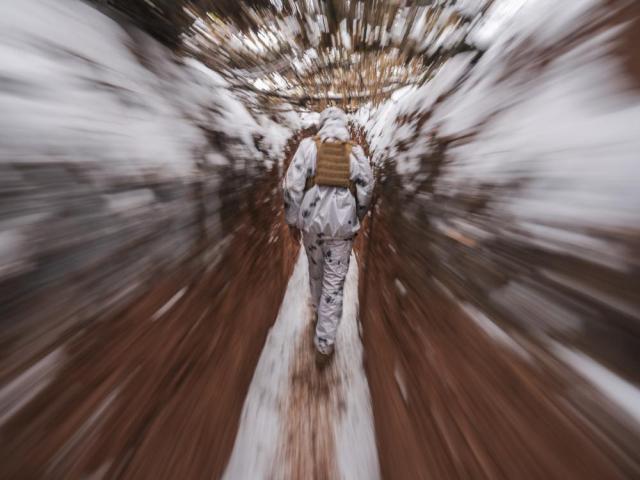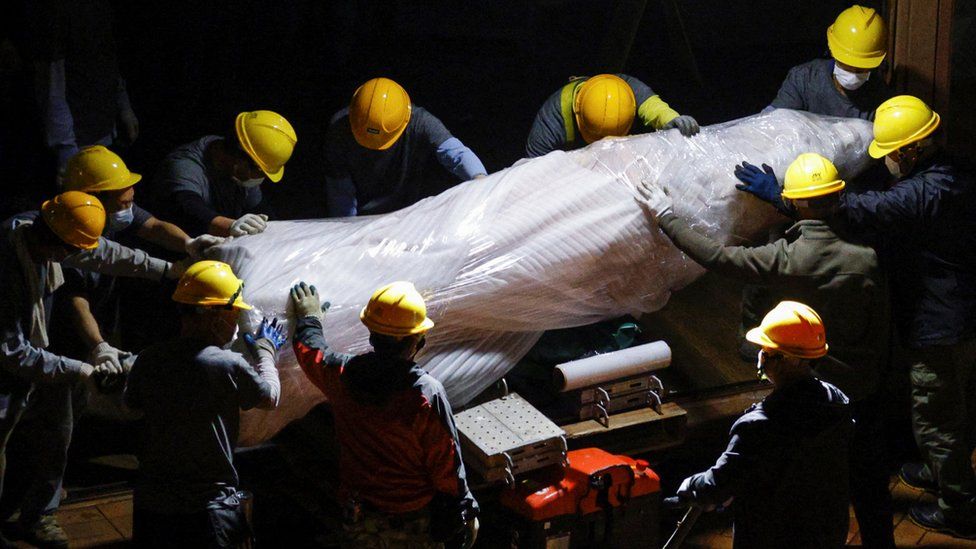Russia denies responding to US proposal on Ukraine crisis

Russian officials on Tuesday denied reports that Moscow sent Washington a written response to a U.S. proposal aimed at deescalating the Ukraine crisis, a day after the two countries exchanged sharp accusations at the U.N. Security council and as a series of high-level meetings in Moscow and Kyiv were underway.
The Kremlin is seeking legally binding guarantees from the U.S. and NATO that Ukraine will never join the bloc, deployment of NATO weapons near Russian borders will be halted and the alliance’s forces will be rolled back from Eastern Europe.
The demands, rejected by NATO and the U.S. as nonstarters, come amid fears that Russia might invade Ukraine, fueled by the buildup of an estimated 100,000 Russian troops near Ukraine’s borders. Talks between Russia and the West have so far failed to yield any progress.
Washington has provided Moscow with a written response to the demands, and on Monday three Biden administration officials said the Russian government sent a written response to the U.S. proposals. A State Department official has declined to offer details, saying it “would be unproductive to negotiate in public” and that Washington would leave it up to Russia to discuss the counterproposal.
But Deputy Foreign Minister Alexander Grushko on Tuesday told Russia’s state RIA Novosti news agency that this was “not true.”
The agency also cited an unnamed senior diplomat in the Russian Foreign Ministry as saying that Foreign Minister Sergey Lavrov sent a message to his Western colleagues, including U.S. Secretary of State Antony Blinken, about “the principle of indivisibility of security,” — that the security of one nation should not be at the expense of others — but it wasn’t a response to Washington’s proposals.
Kremlin spokesman Dmitry Peskov told reporters Tuesday that there has been “confusion” and that Russia’s response to the U.S. proposals is still in the works. What was passed on to Western officials “were other considerations, on a somewhat different issue,” Peskov said.
On Monday, Russia accused the West of “whipping up tensions” over Ukraine and said the U.S. had brought “pure Nazis” to power in Kyiv as the U.N. Security Council held a stormy debate on Moscow’s troop buildup near its southern neighbor.
U.S. Ambassador Linda Thomas-Greenfield shot back that Russia’s growing military force along Ukraine’s borders was “the largest mobilization” in Europe in decades, adding that there has been a spike in cyberattacks and Russian disinformation.
The harsh exchanges in the Security Council came after Moscow lost an attempt to block the meeting and reflected the gulf between the two nuclear powers. It was the first open session where all protagonists in the Ukraine crisis spoke publicly, even though the U.N.’s most powerful body took no action.
More high-level diplomacy is expected this week. Russian President Vladimir Putin met with Hungarian prime minister Victor Orban in Moscow on Tuesday and said in his opening remarks that the Kremlin’s security demands would be discussed. Orban, in turn, stressed that no European leader wants a war in the region.
Later in the day, Lavrov and Blinken were expected to have a phone call, and British Prime Minister Boris Johnson was scheduled to meet with Ukrainian President Volodymyr Zelenskyy in Kyiv.
In the meantime, Zelenskyy signed a decree on Tuesday expanding the country’s army by 100,000 troops, bringing the total number to 350,000 in the next three years, and raising army wages.
Zelenskyy, who in recent days sought to calm the nation in the wake of fears of an imminent invasion, said Tuesday that he signed “this decree not because of a war.”
“This decree is so that there is peace soon and further down the line,” the president said.
The decree ended conscription starting from Jan. 1, 2024, and outlined plans to hire 100,000 troops over the next three years.
Associated Press writers Edith M. Lederer at the United Nations, Aamer Madhani and Matthew Lee in Washington, and Yuras Karmanau in Kyiv, Ukraine, contributed to this report.
Denmark on Tuesday became one of the first European Union countries to scrap most pandemic restrictions as the Scandinavian country no longer considers the COVID-19 outbreak “a socially critical disease.”
The reason for that is that while the omicron variant is surging in Denmark, it’s not placing a heavy burden on the health system and the country has a high vaccination rate, officials have said.
Prime Minister Mette Frederiksen told Danish radio it’s too early to know if measures may have to make a comeback.
“I dare not say that it is a final goodbye to restrictions,” she said. “We do not know what will happen in the fall. Whether there will be a new variant.”
Denmark, a nation of 5.8 million, has in recent weeks seen more than 50,000 daily cases on average while the number of people in hospital intensive care units has dropped.
Other EU countries also are relaxing measures. Ireland dropped most of its restrictions and the Netherlands also has been easing its lockdown, though Dutch bars and restaurants still have to close their doors at 10 p.m.
The head of the Danish Health Authority, Søren Brostrøm, told Danish broadcaster TV2 that his attention was on the number of people in ICUs, rather than on the number of infections. He said that number had “fallen and fallen and is incredibly low.” He said 32 coronavirus patients are in ICUs. Several weeks ago, it was up at 80.
The most visible restriction disappearing is the wearing of face masks, which are no longer mandatory on public transportation, shops and for standing clients in restaurant indoor areas. Authorities only recommend mask use in hospitals, health care facilities and nursing homes.
Another restriction that no longer is required is the digital pass used to enter nightclubs, cafes, party buses and to be seated indoors in restaurants.
Health authorities urged Danes to get tested regularly so the country can “react quickly if necessary,” as Health Minister Minister Magnus Heunicke said last week.
Danes “have been very successful in our national vaccine program throughout 2021, a lot of people have received two vaccination shots, and a lot have received three doses as well, and many of those doses were provided in the fourth quarter of 2021,” Jens Lundgren, a professor of viral diseases at the Copenhagen University Hospital told The Associated Press.
More than 60% of Denmark’s population over the age of 12 have gotten the third shot, according to official figures.
The Danish government has warned that the country could see a rise in infections in the coming weeks and said that a fourth vaccination shot might be necessary.
The restrictions were originally introduced in July but were removed about 10 weeks later after a successful vaccination drive. They were reintroduced when infections soared.
In 2020, Denmark became one of the first European countries to close schools because of the pandemic and sent home all non-critical public employees. In neighboring Finland, COVID-19 restrictions will end this month with Prime Minister Sanna Marin saying her Social Democratic-led government would negotiate with the other parties in parliament the timetable for the removal of the measures.
On Monday, border controls at the internal borders between Finland and the other Schengen countries that form Europe’s ID check-free travel area, ended. That restriction was introduced at the end of December to slow down the spread of the omicron variant. Travelers coming from outside the EU will continue to meet border controls at least until Feb. 14. February.
On Tuesday, Norwegian daily Dagbladet reported the first case of COVID-19 ever on the island of Utsira in the North Sea.
“We have avoided it for two years,” mayor Marte Eide Klovning told Dagbladet, adding that the island’s 188 inhabitants had been vaccinated. It was unclear how the virus had reached the island, sitting about 120 kilometers (75 miles) south of Bergen, Norway’s second-largest city.
Not everyone was going in the same direction as Denmark.
Italy has been gradually tightening its health pass requirements during the omicron surge. As of Monday, Italy requires at least a negative test within the previous 48 hours to enter banks and post offices, and anyone over 50 who has not been vaccinated risks a one-time 100-euro ($112) fine.

For victims, Syria torture trial is 1st step toward justice
- Victims of torture in Syria and human rights activists say they hope the upcoming verdict in a landmark trial will be a first step toward justice

Pillar of Shame: Hong Kongs Tiananmen Square statue removed
- A famous statue at the University of Hong Kong commemorating the Tiananmen Square massacre has been removed.

The Womens Tennis Association (WTA) has announced an immediate suspension of all tournaments in Chi
- The Womens Tennis Association (WTA) has announced an immediate suspension of all tournaments in China,

The Marvels Movies Spider-Man Now Way Home Released Starting
- After Movie Spider-Man Now Way Home 2021, 13 Marvel Cinematic Movies Released in 2022 and 2023 Starting from The Marvels
Category
- Advertising
- Art & Culture
- Anime
- Attorney
- Autos
- Awards
- Business
- Careers
- Claim
- Classes
- Computers
- Conference Call
- Cord Blood
- Credit
- DIY and How to's
- Site Development
- Donate
- Education
- Electricity
- Entertainment
- Family & Relations
- Finance
- Food
- Gas
- Games
- Health
- Hobbies
- Home
- Insurance
- Internet
- Investment
- Lyrics
- Lawyer
- Loans
- Marketing
- Mesothelioma
- Mortgage
- News
- Online Degree
- Outdoor
- Publishing
- Real Estate
- Recovery
- Rehab Rehabilitation
- Relationships
- Search Engines
- Self Help
- Others
- Shopping
- Society
- Software
- Spirituality
- Sports
- Technology
- Trading
- Transfer
- Travel
- Treatment
- Web 2.0
- Web Design
- Web Development
- Web Hosting
- Webmaster
- Accounting